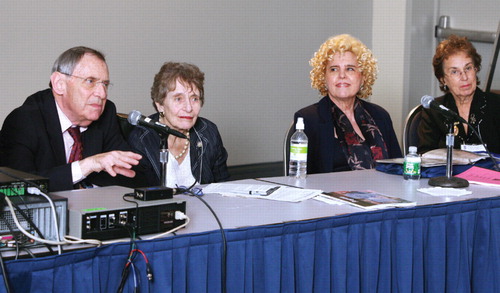Ethics Boundary Not Always Clear in Encounters With Ex-Patients
An underdiscussed professional issue that can put psychiatrists in career-damaging situations is where to draw boundaries in nonprofessional relationships with former patients.
The complexities of personal, professional, business, and community relationships with former patients can affect psychiatrists criminally and financially, as well as undermine their professional standing, according to experts speaking at a symposium at APA's 2008 annual meeting in Washington, D.C., in May.
The APA ethics guideline barring posttreatment romantic relationships leaves unclear the many other possible posttreatment circumstances that psychiatrists can face, such as unplanned interactions with former patients in small-town settings where it is impossible to avoid such encounters, for example.

“This is an issue that doesn't get a lot of discussion,” said Malkah Notman, M.D., a professor in the Adult Psychiatry Residency Program at Cambridge Health Alliance and a consultant to APA's Ethics Committee, who paraphrases the ethics ban on posttreatment sexual relationships as“ once a patient, always a patient.”
This posttreatment ban “doesn't address the range of posttermination relationships,” she said.
Of course it is broadly accepted that posttreatment sexual relationships between a physician and his or her former patient are unethical. But does the same rule hold true about business dealings with former patients, for example? Similarly murky is the question of whether psychiatrists can accept barter in lieu of cash as payment for treatment.
“The key issue is [whether it is] exploiting a patient,” Notman said. But, even that standard “leaves some of these issues ambiguous.”
Among the most ambiguous relationships are those entered into during hospital stays, when a physician may only have brief contact with another doctor's patient. The rules on posttreatment relationships also can be muddied by former patients who were previously colleagues or social acquaintances.
Notman noted that one-time consultations for therapy and one-time medical compliance checkups have much less impact on patients than long-term treatment relationships.
Linda Jorgenson, J.D., a Massachusetts attorney who has represented many individuals allegedly abused by their psychotherapists, said the central issue for current and former patients is the power imbalance between doctor and patient. Patients' vulnerability requires boundaries to protect the therapeutic process and to keep them safe, she said.
So what is the rule in a case in which a former patient seeks a relationship with his or her physician years after the physician-patient relationship has ended? Jorgenson said the safest thing to do is to“ forget it.” Although such relationships are unlikely to end up in a catastrophic legal case, they can. Even happy relationships can end with one party nursing a grievance that “raises all sorts of possibilities,” in terms of the legal fallout.
Jorgenson noted that the standard that translates as “once a patient, always a patient,” in terms of romantic relationships, creates a legal danger for psychiatrists, especially because it is much stricter than standards used by other professionals in mental health care. Some states have criminalized such relationships, and they have become grounds for a civil lawsuit or loss of medical license.
Elissa Benedek, M.D., a clinical professor of psychiatry at the University of Michigan Medical Center and a past president of APA, said most of the cases dealt with now fall into the “gray area” of ethics guidelines and the law because the most egregious cases of patient abuse seem to have occurred much more often in previous decades, while today are much more rare.
Although posttreatment relationships are full of gray areas, Jorgenson said one issue on which psychiatrists should draw a clear line is bringing a former patient into their home. She described one recent case in which a former patient was hired to work as a psychiatrist's nanny, and she later sued for over $1 million after there was a falling out.
Financial collaborations with former patients should be avoided, Notman maintained. She also advised against seeking or accepting investment advice from them.
Notman also suggested that psychiatrists reference a key resource that comes with APA membership, namely APA's Principles of Medical Ethics With Annotations Especially Applicable to Psychiatry.
Or they can contact a member of APA's Ethics Committee or the staff member who coordinates the work of that committee, who will refer a member to the relevant APA guideline. ▪



